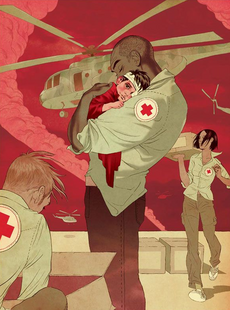International Federation of Red-White Societies
 Emblem of the IFRW | |
| Abbreviation | IFRW |
|---|---|
| Formation | 12 November 1911 |
| Type | Humanitarian aid organization |
| Purpose | To carry out relief operations to assist victims of disasters and warfare, and combine this with development work to strengthen the capacities of its member societies |
| Headquarters | Satavina, Astaria |
Secretary General | TBA |
President | TBA |
Main organ | Governing board |
Budget | TBA |
The International Federation of Red-White Societies (IFRW) is a worldwide humanitarian aid organization that conducts operations before, during and after disasters both natural and manmade to meet the needs and improve the lives of vulnerable people. It aims to do so with complete impartiality, through a mixed network of volunteer and paid members who fulfill a variety of niches, including but not limited to healthcare, food production and distribution, as well as the construction and maintenance of vital infrastructure projects such as wells and shelters.
History
Founding
On 12 November 1911, the day after the conclusion of the Great War, representatives from both sides of the conflict came together in Satavina, recognized internationally as a neutral ground due to Astaria's refusal to participate in the war, to establish an international federation to unify the myriad health-oriented humanitarian organizations that existed in Anteria. Their stated goal was "to strengthen and unite, for the good of all people, already-existing healthcare societies and to promote the creation of new such organizations". The initiative was taken by Syrri an-Heri, then the chairman of the Astari Red-White Society, with the support of Aucanna XV, the ruling Princess of Astaria, who had given numerous addresses to the international community before and during the war calling for greater humanitarian efforts if not peace. This newly created federation of National Societies expanded the international mandate of the Red-White Movement, which initially only comprised Astari efforts to promote wartime humanitarian efforts, to a truly international affair.
The primary postwar activities of the IFRW included providing inoculations in order to fight the spread of epidemics, wartime medical support throughout the Era of Civil Wars and subsequent conflicts, and general peacetime efforts to expand the capacity of its National Societies to support their people.
In 1922, shortly before the death of first President Syrri an-Heri, the league's governing board believed it was capable of accommodating new societies that, for a number of reasons, had not decided to join the IFRW from its inception. In the following decades, the federation admitted a large number of National Societies, eventually resulting in the league being recognized as a truly universal organization.
Missions
The first large-scale relief actions of the league came after the onset of the Era of Civil Wars, where doctors, nurses and engineers were sent to over half a dozen countries experiencing civil unrest in order to treat injuries and establish functional infrastructure for the citizens of those countries, the majority of which had lost at least some access to basic resources needed for survival.
The countries whose economies were most affected by the Great War and subsequent civil wars were often the targets of anti-poverty programs devised by the IFRW.
In June 1940, the IFRW endorsed and actively campaigned for Anterians to do all that was in their power to compel their governments to sign the Ardgan Declaration, given its alignment with the organization's ideals.
Until 1997, all disaster relief operations were responded to by the international organization as a whole. societies were used to provide support through the Federation itself, with all resources being used by the federation in the response to disasters under their coordination. After 1997, this approach was changed, with greater agency and funding being directed to national organizations deemed to be in need.
Activities and responsibilities
The IFRW supports and coordinates the activities of its dependent societies all throughout Anteria, as well as supporting the development of new societies in countries where no such organizations exist. A new society must be recognized by the IFRW and the country within which it operates to be considered legitimate. Another major mission of the IFRW is its work towards a codified worldwide ban on chemical weapons, as well as promotion of efforts to bring support to those who have been affected by their use.
The stated tasks of the IFRW can be summarized as follows:
- to promote humanitarian principles and values
- to support its dependent societies and promote their recognition
Organization
Presidents of the Federation
Former presidents have been:
|
Countries with Red-White Societies
|
